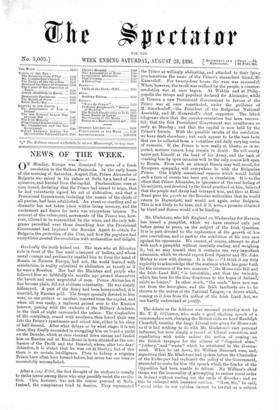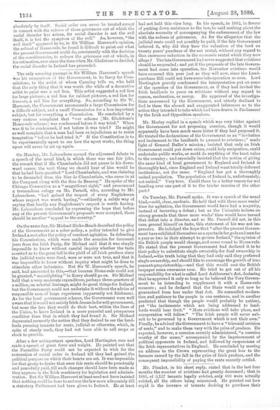The debate on the Address was resumed yesterday week by
Mr. T. P. O'Connor, who made a good slashing speech of a commonplace sort, charging the Belfast riots on Lord Randolph Churchill, treating the large Liberal vote given for Home-rule as if it had nothing to do with Mr. Gladstone's vast personal influence, but were simply a record of Liberal conviction, and repudiating with noble ardour the notion of coming on the British taxpayer for the scheme of " disguised alms," " jobbery," and " waste " which he attributed to the Govern- ment. When he sat down, Sir William Harcourt rose, and, regretting that Mr. Gladstone had spoken before the Chancellor of the Exchequer had explained the policy of the Government, proceeded to make for him the speech which the Leader of the Opposition had been unable to deliver. Sir William's chief theme was the immorality of attempting to restore social order in Ireland without rooting out the seeds of disorder ; and on this he enlarged with immense unction. "Now, Sir," be said, " social order in our opinion cannot be treited as a subject
absolutely by itself. Social order can never be treated except in concert with the redress of those grievances out of which the social disorder has arisen, for social disorder is not the evil itself, it is but the symptom of the evil." As, however, "the evil itself" appeared to be, in Sir William Harcourt's opinion, the refusal of Home-rule, he found it difficult to point out what the present Government could do, consistently with the decision of the constituencies, to redress the grievance out of which, in his estimation, ever since the time when Mr. Gladstone so decided, the social disorder in Ireland has proceeded.



































 Previous page
Previous page